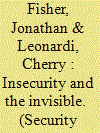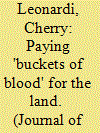|
|
|
Sort Order |
|
|
|
Items / Page
|
|
|
|
|
|
|
| Srl | Item |
| 1 |
ID:
182650


|
|
|
|
|
| Summary/Abstract |
The search for security has become an almost permanent feature of the contemporary lived experience and what Brian Massumi has called an ‘operative logic’ for states across the globe. The modern study – and practice – of security has, nonetheless, been largely concerned with the protection, preservation and sustaining of the material, the tangible and the visible. For many people around the world, however, feelings of security also derive from understandings of an individual or community’s relationships with invisible and spiritual forces. Religious devotion and divine protection represent a central plank of security for many, just as fears of divine retribution, demonic possession or witchcraft feature as a central dimension of insecurity for many others. This remains, however, a significant blindspot in much of security studies – and, indeed, often eludes and challenges state authority as much as it intersects with and enhances it. Drawing on fieldwork undertaken in northwestern Uganda, this study reflects critically on the provenance and implications of this blindspot and argues for an expanded understanding of what ‘counts’ as (in)security. In doing so, the article emphasizes the global character of spiritual (in)security and the challenges an understanding of (in)security that encompasses this pose to longstanding scholarly and practitioner associations of (in)security with state authority.
|
|
|
|
|
|
|
|
|
|
|
|
|
|
|
|
| 2 |
ID:
078566


|
|
|
|
|
| Publication |
2007.
|
| Summary/Abstract |
Generational tension and youth crisis have been prominent themes in recent analyses of civil conflict in Africa. Field research in Southern Sudan in 2004-2006 suggests that the analysis does not fit the Sudanese war. This article examines a structural opposition between the sphere of military/government (the 'hakuma') and the sphere of 'home'. It argues that to be a 'youth' in Southern Sudan means to inhabit the tensions of the space between these spheres. While attempting to resist capture by either sphere, youth have used their recruitment by the military to invest in their home or family sphere. Their aspiration to 'responsibility' illustrates not generational rebellion, but the moral continuity in local society, also evident in discussions of marriage
|
|
|
|
|
|
|
|
|
|
|
|
|
|
|
|
| 3 |
ID:
108266


|
|
|
|
|
| Publication |
2011.
|
| Summary/Abstract |
This paper challenges the prevailing focus on ethnic division and conflict in Southern Sudan in recent years, demonstrating that even within ethnically divisive debates over land, there are shared, transethnic levels of moral concern. These concerns centre on the commodification and monetisation of rural and kinship resources, including human life itself, epitomised in ideas of land being bought with blood, or blood being turned into money by the recent wartime economy. It argues that the enduring popular ambivalence towards money derives not only from its commonly observed individualising properties, but also from the historical association of money with government. Southern Sudanese perceive historical continuity in government consumption and corruption, and express concern at the expansion of its alternative value system into rural economies during and since the war. Whilst seeking to access money and government, they nevertheless continue to employ a discursive but powerful dichotomy between the moral worlds of state and kinship.
|
|
|
|
|
|
|
|
|
|
|
|
|
|
|
|
|
|
|
|
|